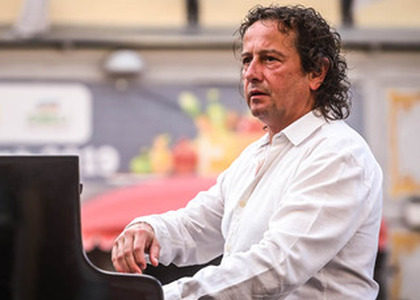> Interviews

Interview with Horia Mihail
Between June 2nd and 29th, 2025, Horia Mihail once again sets out on the road with The Traveling Piano, a project now reaching its 15th edition. On this occasion, the musician spoke with Ioana Țintea.
Mr. Horia Mihail, this year marks the 15th anniversary of the national tour The Traveling Piano. What does this milestone mean to you?
It means a great deal of time spent performing a variety of musical programs in cities across Romania. Time goes by, things change, people change-but music, music stays the same.
What have been the greatest joys you've experienced over these 15 years of touring?
I feel both happy and proud that these "inventions" of mine-these national tours that actually began long ago, with the first Romanian Piano Trio tour in 2006-have helped form small communities of music lovers in cities where there was little to no artistic or musical activity. These communities have gradually grown. The number of tours has increased dramatically in recent years, and other creators of musical projects have emerged as well. Our country is slowly becoming an important space for chamber music-not at all like 20 years ago, when this kind of artistic expression was almost nonexistent.
Over the past 15 years, The Traveling Piano has reached dozens of cities, as you've said. It has led to the release of four albums under the Casa Radio label and brought classical music closer to the public-even to places where such concerts are rare. Did you imagine from the start that the project would have such a lasting and meaningful impact?
Yes, because I tend to imagine things the way I want them to unfold. Back in 2010, I discovered some pianos in the basement of the public radio station-on paper they were valued at somewhere between 2 and 12 lei and were marked for disposal. I proposed to the management at the time, who fortunately embraced the idea, that we repurpose these instruments and take them to key Romanian cities where concert pianos were lacking and live performances were simply not possible. Today, those pianos are still in use in places like Alba Iulia, Caracal, Tulcea, and Roman.
How did you design this year's special edition, titled Passion?
This edition is special to me personally because, after a period when I wasn't performing much on stage for personal reasons, it feels like a kind of artistic rebirth. I'm preparing this program with both hope and great enthusiasm. It's designed to be engaging for the audience-a journey through short pieces spanning the history of music, starting with Domenico Scarlatti and ending with Tiberiu Brediceanu, and even including an encore by Dan Dediu.
Which cities are included in this year's tour, and how did you choose them?
It's a challenging year, and the selection had a lot to do with financial constraints. The team responsible for organizing and promoting the tour had to make careful choices. This time, I'll be performing in Roman, Iași, Bistrița, Brașov, Bucharest, Caracal, and then once again in Bucharest.
Translated by Miruna-Camelia Baicu,
University of Bucharest, Faculty of Foreign Languages and Literatures, MTTLC, year I
Corrected by Silvia Petrescu














